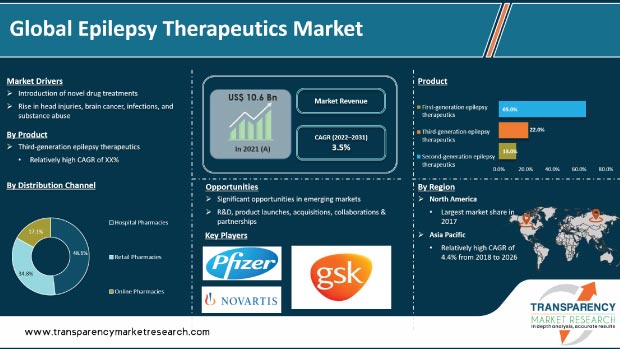The global epilepsy therapeutics market was valued at US$ 12.9 Bn in 2018. It is projected to expand at a compound annual growth rate (CAGR) of 3.4% from 2019 to 2027 according to a new report published by Transparency Market Research (TMR) titled “Epilepsy Therapeutics Market Global Industry Analysis, Size, Share, Growth, Trends, and Forecast, 2019–2027” the report suggests that increase in the geriatric population and number of epilepsy cases is expected to propel the epilepsy therapeutics market in the near future. North America is expected to dominate the global market, owing to the rise in patient population, high geriatric population, and availability of advanced drugs. The market in Asia Pacific is expected to expand at a CAGR of 4.4% during the forecast period, due to the increasing geriatric population, rising awareness, and growing patient population in the region. Moreover, research and development activities and initiatives by governments in the healthcare sector are anticipated to further boost the market in Asia Pacific.

Value added features in epilepsy therapeutics to fuel global market
The global epilepsy therapeutics market is expected to be driven by the advanced and high efficacy epilepsy therapeutics to provide appropriate treatment, generating positive outcomes by preventing rapid, repetitive, stimulation of the brain that causes seizures. According to WHO, globally, around 2.4 million people are anticipated to be diagnosed with epilepsy every year. Worldwide, approximately, more than 50 million people have epilepsy, thereby making epilepsy a highly common neurological disease, globally. It is anticipated that 70% people suffering with epilepsy could live seizure-free if appropriately diagnosed and effectively treated. Key players offering epilepsy therapeutics in the market are thriving for approvals for new epilepsy therapeutics from government bodies, launching more advanced epilepsy therapeutics, providing effective treatment with fewer side-effects, thus providing an ameliorate product than the existing products in the market.
For More Details, Request A PDF Brochure Report @ https://www.transparencymarketresearch.com/sample/sample.php?flag=B&rep_id=2448
Third generation epilepsy therapeutics is projected to be highly lucrative product segment
According to Epilepsy Society, anti-epileptic drugs (AEDs) are the main type of treatment for most people with epilepsy. Up to 70% of people could get rid of seizures with accurate medication. Anti-epileptic drugs (AEDs) are a type of medication that aims to prevent seizures from occurring. Third generation epilepsy therapeutics have been introduced in the last few years, thereby possessing enhanced pharmacokinetics and pharmacodynamics. Third generation epilepsy therapeutics have multiple diverse molecular mechanisms of action, thereby offering a novel and advantageous approach to treat epilepsy, specifically in patient population undergoing refractory seizures. Furthermore, third generation epilepsy therapeutics are considered to offer milder adverse effects, better tolerability, less hormonal or drug interactions, and enhanced pharmacokinetic characteristics as compared to that of first generation therapeutics and second generation therapeutics.
Hospital pharmacy segment is estimated to dominate the epilepsy therapeutics market
In terms of distribution channel, the hospital pharmacy segment held a leading share of the global epilepsy therapeutics market in 2018. It is anticipated to gain market share by the end of 2027 and expand at a CAGR of 4.1% during the forecast period. Surge in incidence of epilepsy, improving epilepsy diagnosis rate, increasing hospitalization and emergency department visits for epilepsy, rising number of brain injuries, increasing genetic disorders, congenital defects, and surging number of neurologists and epileptologists drive the hospital pharmacy segment of the global epilepsy therapeutics market. Furthermore, rising number of hospitals and increasing network of key players with hospitals and medical professionals & related care have led to the dominant share held by the hospital pharmacy segment of the global epilepsy market.
North America dominates the global epilepsy therapeutics market, while Asia Pacific offers significant opportunities.
North America accounts for key share of the global epilepsy therapeutics market. The market in the region is likely to expand during the forecast period, due to the rapid rise in geriatric population, increase in pool of patients, and surge in research and development to provide more efficient and advanced products. Moreover, growing numbers of players and their increasing mergers and acquisitions, rising government approvals for the new products, along with the growing adoption of advanced products are driving the epilepsy therapeutics market in North America. The market in Asia Pacific is anticipated to expand at a rapid pace during the forecast period. Growing geriatric population, rising prevalence of neurological disorders, increasing research and development, extensive government initiatives in the healthcare sector, and growing presence and investments by global key players in Asia pacific are boosting the epilepsy therapeutics market in the region.
Development of advanced and efficient drugs and rising product approvals are key strategies adopted by leading players
The report also provide profiles of leading players functioning in global epilepsy therapeutics market. UCB S.A., Teva Pharmaceutical Industries Ltd., Sunovion Pharmaceuticals Inc., and Eisai Co., are leading players operating in the global epilepsy therapeutics market, which account for a significant share. Companies functioning in the epilepsy therapeutics market are focused on strengthening their geographic presence through product approvals by government bodies, collaborations, strategic acquisitions, and mergers with other market players in respective domains and geographies. Strong progressive research and development activities and product pipelines and increasing product approvals are key strategies adopted by these players in order to consolidate their position in the global epilepsy therapeutics market.